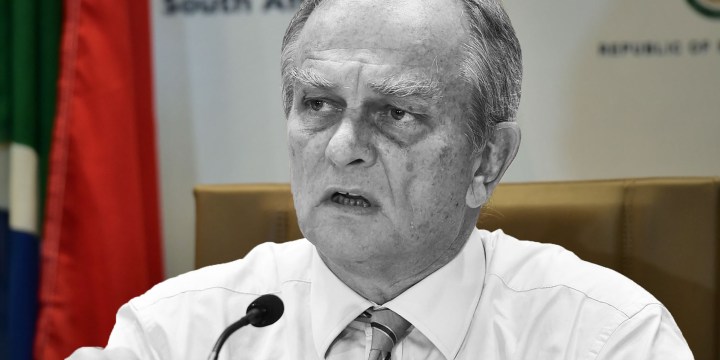BUSINESS MAVERICK
More stress on SOEs as Barnes quits Post Office

After three-and-a-half years as ‘Postman Pat’, iconoclastic banker Mark Barnes has resigned, becoming the latest in a long line of private-sector figures to depart the public sector, further complicating the turnaround of SA’s decimated state-owned enterprises.
After more than three years that brought about relative stability to the South African Post Office, Mark Barnes has resigned as chief executive officer over a difference of strategy with the board regarding the Post Office Bank (Postbank).
The ostensible reason for his departure is a difference on how an integrated logistics, e-commerce and financial services organisation should be structured. But lurking behind this issue is a larger difference in how people from the public and private sectors operate which is reflected also in the recent departures of private sector executives from SAA and Eskom, among many others.
In the Post Office case, the departure of a private-sector executive is particularly troubling because Barnes engineered a remarkable turnaround of an organisation which the current board recognises was “on its knees” financially and operationally when he arrived. Perhaps more importantly, Barnes thrust the organisation into the grand dispute about the payment of social grants by Net1, claiming the service for the Post Office, and consequently effectively saving both government and the poorest South Africans billions of rands.
Having successfully taken over the payment of social grants — something many claimed the organisation was not capable of managing — Barnes’ position was transformed from being the saviour of a struggling organisation on the margins of government to being thrust into control of government’s most central and most crucial social programme. As a political outsider, his position in control of this programme, which now formally resides under the auspices of Postbank, was always going to be tenuous.
Barnes declined to comment, referring all questions to the board of the Post Office. However, it is well known that he was loving the job and saw very vividly the possibilities for developing the organisation into a wider and more integrated service that would include everything from healthcare to e-commerce to logistics.
Ironically for a public sector outsider, the Post Office trade unions are uncomfortable about seeing Barnes go. Aubrey Tshabalala, the National Secretary-General of the Communications Workers’ Union which represents about 40% of Post Office staff, said the union was “disconcerted” about Barnes’ departure.
“He was working very closely with labour; it was not all rosy, but there was a bigger picture. Now this brings about a gloomy picture.”
Technically, the reason for his resignation stems from a problem with Reserve Bank rules relating to the financial stability of financial institutions which require that the shareholders of financial institutions should not themselves be under financial stress. This was very much the case when Barnes took over the Post Office, but is much less so now.
The board of the Post Office was fulsome in its praise of Barnes and claims it is supportive of his strategy which it will continue to execute. But Charles Nwaila, a non-executive board member, said that after an exhaustive study, the government decided to separate Postbank from the Post Office.
Under this plan, Postbank will be controlled by a structure that is independent of the Post Office. “This means the Postbank will still work from the properties, the post offices around the country, but under a service-level control agreement,” said Nwaila. Presumably, Postbank will have its own board.
Under the option favoured by Barnes, Postbank would remain under the control of the Post Office and would continue to provide financial services and e-commerce to customers, including the distribution of social grants. But this would require the Post Office group to be recapitalised to the tune of R4.1-billion in order to meet the Reserve Bank’s licensing conditions, said Nwaila.
“As a standalone entity, the Postbank is adequately capitalised and meets the Reserve Bank’s conditions for a licence.”
Nwaila said Barnes’s leadership of the loss-making institution over the past three years provided operational and financial stability, with the entity having “turned the corner and settled all its debts”.
“We are in line to break even by financial 2021. We want to assure our clients that things are under control,” said Nwaila.
From empty coffers when Barnes took over, the group will report a net cash balance of R1.8-billion for the year ended March 2019.
The Post Office will continue to get more support to focus on four core areas of its business, said Nwaila. Those will include delivering mail, e-commerce and logistics.
Barnes joined a debt-laden Post Office whose operations had all but collapsed in 2016 after convincing the government he was the right man to restore it to operational and financial stability. With piles of mail lying undelivered at its depots, the utility was unable to meet its financial obligations and there were delays in the payment of salaries, resulting in a series of strikes.
“The outgoing CEO led the company to stability over the past three-and-a-half years. All those are now behind us; we have turned the corner and will be profitable soon,” said Nwaila. The Post Office has stress-tested its liquidity position and is confident it can meet its rent and other liquidity obligations over the next 12 months.
After a R3.7-billion capital injection by the government in December 2017, the Post Office managed over the past three years to settle all its debt and reduced its net loss by R79-million to R908-million for the year ended March 2018. This has increased to a net loss of R1.1-billion in the year ended March 2019.
The Post Office will report its financial results for the year ended March 2019 late in August. SA Post Office Group COO Lindiwe Kwele has been appointed interim CEO by the board until the recruitment of a new CEO. BM



















 Become an Insider
Become an Insider